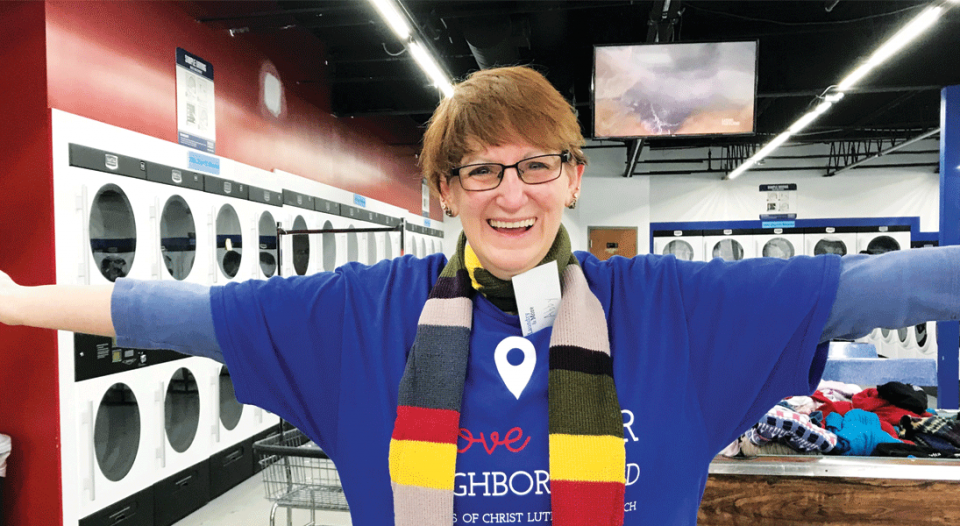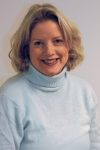Abby Vesga understands what it’s like to not know where you will lay your head at night, when your next meal will be or how you will clean your clothes.
Vesga, a member of Servants of Christ Lutheran Church in Indianapolis, has been homeless four times during her life. Knowing what it’s like not to have a place to launder her clothing inspired her to become the driving force behind a new congregational ministry called Laundry & More, which provides residents with money to wash their clothes at a local laundromat, along with a range of other social services.
“When you don’t have a place to do your laundry, you’re doing what you can in a sink in a truck stop with hand soap,” she said.
The ministry, held from 10 a.m. to 1 p.m. every Tuesday, aims to solve that problem and many others. It launched last February at the Post Road Laundromat on the east side of Indianapolis. Every week, volunteers from the congregation come with quarters that are dispensed to people to do their laundry.
On the first day the program was held, volunteers quickly used up the $100 in quarters they had brought and had to get more, said Wade Apel, pastor of Servants of Christ. Today, they regularly dispense between $400 and $500 in quarters every week.
Vesga estimates they’ve helped more than 1,100 families and done 8,000 loads of laundry.
The program always starts with a prayer, followed by a group cheer of “Let’s do laundry!”
In addition to helping residents do their laundry, 10 volunteers serve a meal and distribute clothing, shoes and household items. There’s also a play area for children.
Many hands make for light loads
When Vesga first approached Apel about starting the program, he challenged her to garner support from the congregation and other community resources, including the police and fire departments, the school district and other social service agencies.
Her first step was to find a laundromat that would host the program. “I found one on my third call,” Vesga said.
She also received congregational support. Parishioner Kathy Bender thought the ministry sounded like a common-sense way to serve. She regularly volunteers with Laundry & More, arranging for sandwiches, beverages and other supplies.
When Vesga approached social service agencies, they were excited by the practical aspect of the ministry. There is no schedule, but the congregation sets aside an area in the laundromat for agencies that want to participate.
A recent laundry session involved representatives from a domestic violence agency and from the U.S. Census, the latter of whom talked about hiring temporary census workers. The Marion County Public Health Department also attends and has provided both lead testing and screening for HIV and AIDS and other sexually transmitted diseases.
One key to the program’s success was receiving support from the school district. “The school district handed out flyers for the program,” Bender said. “Some teachers were there on the first day. We figured the schools would be the perfect way to open the door for us, and they were.”
Apel said their intent isn’t to preach to people. “Our primary objective is to show them God’s love in their community,” he said.
The ministry’s volunteers are encouraged to respect and embrace everyone. “I never wanted this to appear like we’re coming in and trying [to] tell you what to do or how to live,” Vesga said. “Our message is that we’re going to love you and help you, and here’s what you can get out of this.
“Every person has to be seen and heard. We need to talk to them to find out what’s going on in their lives and how we can help.”
One Laundry & More participant, Robert (last name withheld), said the ministry has made a difference. “My life is changing; I have hope again,” he said.
Robert has seen optimism spread among other participants. “People who had stopped looking for jobs have hope and are looking again,” he said. “People who were afraid have a sense of belonging. It has been a while since people took the time to stop and get to know what is happening here. The clean laundry helps, but the caring makes the difference.”
Participants have started to contribute, too, whether they’re helping someone load a washer or sweeping up after the session. “They’re taking ownership of the program,” Bender said. “They’re sharing in the workload, which is something we hoped they’d do.”
Bender said part of the program’s success comes from the love and respect they all show each other. “Every time we open the door, we see Jesus walk through the door,” she added. “And we hope they see Jesus in us.”





